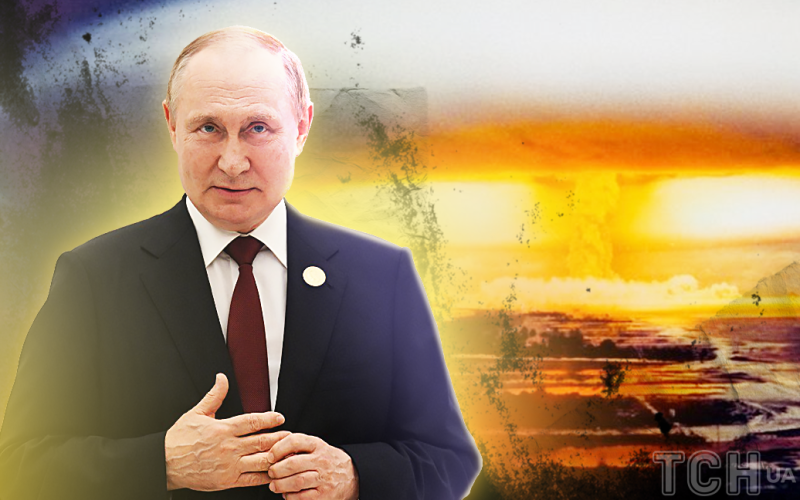
In a new round of escalation of nuclear threats, the Kremlin moved tactical nuclear weapons to Belarus, which is closer to NATO. However, now this saber-rattling does not shock either the West or Ukraine.
Russia has moved tactical nuclear weapons from its borders to neighboring Belarus, several hundreds of kilometers closer to NATO territory. Thus, Putin maintains his threats to the Alliance due to further support for Ukraine from partners.
Foreign Policy writes about this.
“The move, which Putin first announced last June, is presumably aimed at increasing pressure on NATO's eastern flank,” the publication writes.
It comes after years of “nuclear saber rattling” aimed at scaring the West into reducing its support for Ukraine, which is in its third year of war with Russia, although NATO officials insist the move will dramatically does not change the nature of the military threats that Russia poses to the Alliance.
Arvydas Anusauskas, Lithuania's defense minister, was the first official in the NATO alliance to confirm news of the deployment. He warned that the risks of Western inaction were high, citing the West's weak response to Russia's move of new nuclear weapons to the Kaliningrad Peninsula, which borders Poland and Lithuania on both sides.
“We would like to see a stronger response to this. If [the Russians] move nuclear weapons closer to us, we should also move,” Anusauskas said then.
The nuclear question has been hanging over the heads of Western leaders ever since Russia began its invasion of Ukraine. Senior U.S. officials believed Putin raised the possibility of using limited-yield tactical nuclear weapons in 2022 as he faced Ukrainian victories and significant battlefield setbacks before the conflict reached a stalemate the following year.
Putin has not removed this threat from the agenda, even when the conflict is at a relative stalemate. On Wednesday, March 14, on the eve of the presidential elections in Russia, he went even further. “Russia-1” and the RIA news agency about the prospect of a nuclear war with the West, answering a question about threats to Russian sovereignty. However, the Russian leader noted that he does not believe that “everything is rapidly moving” towards a nuclear conflict. He also countered that he was considering the use of tactical nuclear weapons in Ukraine in 2022, saying “there has never been such a need.”
Western intelligence officials and open source researchers have spent months tracking the status of the Russian deployment in Belarus, which Putin himself has framed as a warning to the West. The transfer of weapons to Belarus marks one of the western deployment points of the Kremlin's nuclear arsenal.
The move of nuclear weapons has a clear political message, but some experts have downplayed the military significance of the move, arguing that the weapons pose no greater or lesser threat to the Alliance simply because they were moved a few hundred miles closer to the territory NATO.
“The Russians can get to any place in NATO territory with nuclear missiles on their territory. That doesn't change the threat landscape at all. So this is a purely political message,” said Rose Gottemoeller, a former senior US verification envoy Over Armaments and Deputy Secretary General of NATO.
Others went further, arguing that public reaction to the movement of nuclear weapons in Belarus simply plays into Russia's hands.
“What's the difference, actually? Why is every discussion about “Lord, we have nuclear weapons in Belarus, look what happens” – this is just a Russian plan to take over Belarus. This is just Russian plan to divert attention from Ukraine and create additional topics on our agenda. But in reality this does not make any difference to how Russia behaves,” said Hanno Pevkur, Estonian Defense Minister.
Putin may, however, play out a nuclear threat against NATO in the near future, especially as Russia tries to rebuild its shattered military in Ukraine and sees Western military support for Ukraine beginning to wane. But, on the other hand, the West's resolve against nuclear blackmail is growing.
“[Putin] wants to make sure that there is a limit to the current debate in the US and Europe over whether to continue to support Ukraine. This is not to say that Ukraine and NATO allies in Europe are immune from these threats, but they no longer have the shocking effect they had in the early days of the invasion,” said Rose Gottemoeller.
Recall that earlier Vladimir Putin, in an interview with Russian propagandist Dmitry Kiselev , announced his readiness for a nuclear war. Like, “the Russian nuclear triad is more modern than any other” .
At the same time, French President Emmanuel Macron has already reacted to such daring words from Putin and said that it was “inappropriate to threaten” the French when they also have nuclear weapons.
Related topics:
More news

